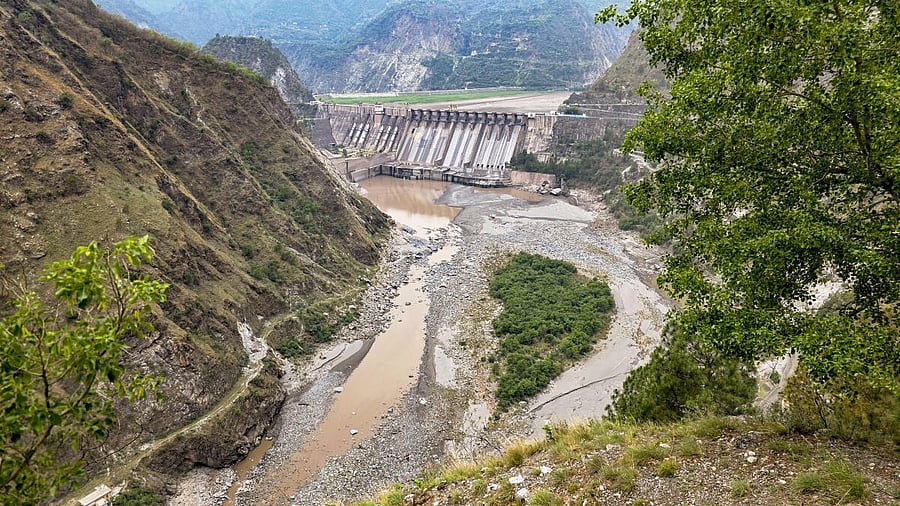
A dam on the Indus river system, in Reasi, J&K (Image for representation)
Credit: PTI Photo
Two and a half months after suspending the India-Pakistan Indus Waters Treaty (IWT) in the wake of the April 22 terrorist attack near Pahalgam in Jammu and Kashmir, New Delhi has quietly set in motion an ambitious plan — one that could change water resource management in the Union Territory and other northern states, reignite interstate tensions, and escalate geopolitical tension with Islamabad.
A 113-kilometre-long canal is at the centre of the plan for the inter-basin transfer of water – a project that aims to divert surplus flows from J&K to Punjab, Haryana and even parched Rajasthan.
The Union Ministry of Jal Shakti, working on what officials describe as a “war footing”, has reportedly initiated pre-construction assessments, including a detailed feasibility study. This includes exploring the engineering, ecological, and legal viability of carving a canal through the geologically fragile Himalayan terrain.
The proposed canal aims to divert water from the Chenab river to the Ravi-Beas-Sutlej system and is expected to be completed within three years. There is also a proposal to eventually link the canal to the Yamuna, which would extend its total length to nearly 200 kilometres, sources told DH.
Experts’ views
But even before a shovel has hit the ground, the project has triggered concerns among scientists and environmentalists and triggered a war of words among politicians.
“This is not just a canal – it’s a political project dressed up as infrastructure,” says Prof. G M Bhat, renowned geologist and former Head of the Department of Geology at the University of Jammu. “They may talk about diverting water, but the real challenge is storage – and in this region, that’s an engineering nightmare. It’s more about optics than outcomes,” he told DH.
The project came to the public domain a few weeks after India suspended its 1960 Indus Waters Treaty with Pakistan – a World Bank-brokered agreement seen as one of the world’s most resilient water-sharing frameworks. While New Delhi cites export of terror from Islamabad to justify its action, critics say unilateral moves on water risk upending fragile regional stability.
“You can’t revoke the IWT in isolation. It opens a Pandora’s box,” said Bhat. “If we do it with Pakistan, what stops China from blocking the Brahmaputra? Water diplomacy isn’t one-way.”
Ajaz Rasool, a noted hydraulic engineer and environmental consultant, said that the project for inter-basin transfer of water undermined both J&K’s ecological fabric and its constitutional safeguards. “Inter-basin transfers aren’t just about pipes and pumps. They dry wetlands, alter aquifers, and devastate downstream ecosystems. J&K’s waters support glaciers, springs, and fragile seasonal flows. Declaring it surplus without a full hydrological audit is ecological malpractice,” he said.
Political fallout
The proposal stirred political waters across state lines. J&K Chief Minister Omar Abdullah has bluntly stated that the Union Territory’s waters “would not be allowed to be siphoned off” to Punjab or elsewhere.
Politicians in Punjab reacted angrily. Punjab Congress chief Amarinder Singh Raja Warring accused Abdullah of “doing politics over patriotism,” suggesting that opposing the canal was akin to “equating Punjab with Pakistan.” Punjab Chief Minister Bhagwant Mann said that the transfer of water from Chenab could resolve the Sutlej Yamuna Link (SYL) canal dispute between his state and Haryana.
Pakistan’s red line
Pakistan Army Chief Field Marshal Asim Munir has declared water a “red line” and vowed to defend the Indus as a “basic right of 240 million people”. The canal proposal is already being portrayed in Pakistani media as evidence of India’s intent to “weaponise water”.
However, New Delhi’s move, backed by strong political will, signals India’s strategic shift to reclaim control over its resources in response to cross-border terror. While noise around the issue brews, New Delhi’s message is clear: no treaty can survive if it benefits those who sponsor terror.
Experts urge caution
Prof. Shakil Romshoo, Vice Chancellor of the Islamic University of Science and Technology and a leading glaciologist, said that the canal’s impact would be slow but deep. “In the short term, water flows may not be disrupted. But if India starts regulating flows over the next decade, the effects on Pakistan could be severe, especially as climate variability increases.”
He added that while renegotiating the IWT to include China and Afghanistan might be unrealistic, strengthening it to factor in climate change, groundwater depletion, and pollution would be a far more practical route.
Uncharted waters
With both nationalist and environmental narratives hardening, the fate of the 113-km canal and the water politics it symbolises hang in the balance.
For J&K, which is reeling under conflict and ecological stress, the question isn’t just about water transfer but also about territorial rights, environmental justice, and political agency.